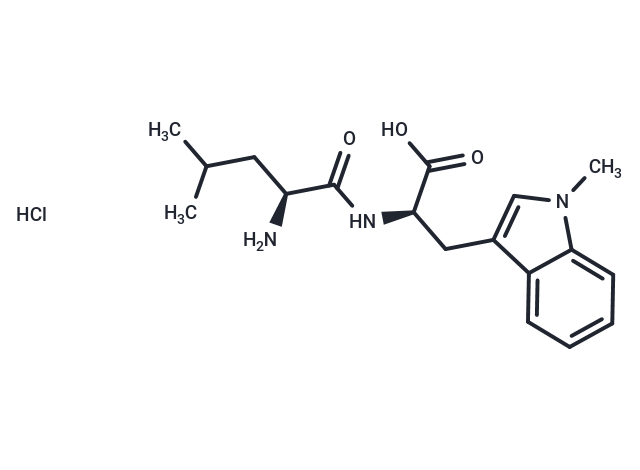 您的购物车当前为空
您的购物车当前为空
NLG802 HCl
一键复制产品信息NLG802 is an orally bioavailable prodrug of indoximod, a methylated tryptophan, with immune checkpoint inhibitory and antineoplastic activities. Upon oral administration, the indoximod prodrug NLG802 is converted to indoximod. Indoximod targets, binds to and inhibits the enzyme indoleamine 2,3-dioxygenase (IDO; IDO1), which converts the essential amino acid tryptophan into the immunosuppressive metabolite kynurenine. By increasing tryptophan levels and decreasing kynurenine levels, indoximod restores and promotes the proliferation and activation of various immune cells, including dendritic cells (DCs), natural killer (NK) cells, and T lymphocytes, and causes a reduction in tumor-associated regulatory T cells (Tregs).

NLG802 HCl
一键复制产品信息NLG802 is an orally bioavailable prodrug of indoximod, a methylated tryptophan, with immune checkpoint inhibitory and antineoplastic activities. Upon oral administration, the indoximod prodrug NLG802 is converted to indoximod. Indoximod targets, binds to and inhibits the enzyme indoleamine 2,3-dioxygenase (IDO; IDO1), which converts the essential amino acid tryptophan into the immunosuppressive metabolite kynurenine. By increasing tryptophan levels and decreasing kynurenine levels, indoximod restores and promotes the proliferation and activation of various immune cells, including dendritic cells (DCs), natural killer (NK) cells, and T lymphocytes, and causes a reduction in tumor-associated regulatory T cells (Tregs).
| 规格 | 价格 | 库存 | 数量 |
|---|---|---|---|
| 25 mg | ¥ 10,600 | 1-2周 | |
| 50 mg | ¥ 13,800 | 1-2周 | |
| 100 mg | ¥ 17,500 | 1-2周 |
产品介绍
| 产品描述 | NLG802 is an orally bioavailable prodrug of indoximod, a methylated tryptophan, with immune checkpoint inhibitory and antineoplastic activities. Upon oral administration, the indoximod prodrug NLG802 is converted to indoximod. Indoximod targets, binds to and inhibits the enzyme indoleamine 2,3-dioxygenase (IDO; IDO1), which converts the essential amino acid tryptophan into the immunosuppressive metabolite kynurenine. By increasing tryptophan levels and decreasing kynurenine levels, indoximod restores and promotes the proliferation and activation of various immune cells, including dendritic cells (DCs), natural killer (NK) cells, and T lymphocytes, and causes a reduction in tumor-associated regulatory T cells (Tregs). |
| 分子量 | 367.874 |
| 分子式 | C18H26ClN3O3 |
| CAS No. | 2071684-09-6 |
| 存储 | Powder: -20°C for 3 years | In solvent: -80°C for 1 year | Shipping with blue ice/Shipping at ambient temperature. |
计算器
体内实验配液计算器
以上为“体内实验配液计算器”的使用方法举例,并不是具体某个化合物的推荐配制方式,请根据您的实验动物和给药方式选择适当的溶解方案。
剂量转换
对于不同动物的给药剂量换算,您也可以参考 更多





 还可以
还可以
 |
|